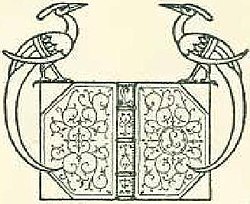
IMPORTED
A DELIGHTFUL, AMUSING AND MOST GAILY COLORED MAP OF LONDON SHOWING QUITE CLEARLY THOSE INTERESTING SPOTS YOU KNOW AND REMEMBER, OR WHICH YOU ARE INTERESTED TO VISIT AND KNOW THE MAP FOLDS, AND FITS IN AN ATTRACTIVE ENVELOPE 12×9. VARNISHED AND FRAMED IN A BRILLIANT MOLDING THE MAP BECOMES A STUNNING WALL DECORATION 36×29. SEND US $1.50 AND OWN THIS MAP.

WASHINGTON SQUARE BOOK SHOP
27 WEST EIGHTH STREET
NEW YORK CITY
Washington Notes
GLEN FRANK, editor of the Century, went to the White House and was introduced to the President.
“Pleased to meet you, Dr. Crane,” said Mr. Coolidge.
A rough winter on editors, Walter Lippmann, of the New York World, called by invitation. It went like this:
The President: Well, Mr. Lippmann, how are things in New York?
Mr. Lippmann: Pretty well, thank you, Mr. President.
A pause.
Mr. Lippmann (by way of opening up a topic): There′s a little unemployment up our way and it looks as if it might get serious.
The President: You know, I was talking to Mellon about that last night. He says he thinks he will have it straightened out in a few weeks. (Turning to go) Well, drop in any time you’re in Washington and we'll talk these things over.
Does Coolidge ever laugh? He does, What, then, does he laugh at? Well———
On a recent Mayflower cruise he laughed once in three days, It was at dinner one evening. They had strawberry shortcake. According to custom the President was served first. A slice was cut and set before him. Then the whole cake was placed before the lady on the President′s right and she was left to shift for herself. She tried to cut a piece but made a mess of it.
“I wonder if this cake is worth such trouble,” she grumbled. And, turning to Mr. Coolidge: “But you had yours cut for you!”
This struck the President as funny and he laughed. Not a noisy laugh. Just a couple of chuckles—and his shoulders bobbed up and down.
Now you know as much as anybody.
One day a fairly long while ago Alice Roosevelt called up the White House and said she wished to see Mrs. Coolidge right away. It was a busy day and the White House social secretary asked if to-morrow wouldn’t do.
“This can’t wait,” said Mrs. Longworth. “I'll be right over.”
A few minutes later Alice breezed in with the announcement that she was going to have a baby.
A few days later there were luncheon guests at the White House and Mrs. Coolidge, who is a normal sort of person and pretty popular, repeated the big news. Considerable sensation.
“When?” asked someone.
“You know,” said Mrs. Coolidge, “I forgot to ask.”
“About the middle of February,” said Mr. Coolidge, who up to that time had taken no part in the conversation.
The late Henry Cabot Lodge was a commanding figure in the Senate when Calvin Coolidge was the mayor of Northampton. When Mr. Coolidge became President Mr. Lodge was still in the Senate, though more of a fixture than a figure.
Still, there was a lot to Lodge which some people missed. He wasn’t so darned high-hatty, for instance, but what he could strike up a comradely fellowship with his junior colleague, the Honorable Dave Walsh, a Democrat.
“Well, Senator,” said Mr. Walsh shortly after the advent of Cal, “What do you think of Mr. Coolidge’s being in the White House?”
“Well, Senator,” replied Mr. Lodge after a long pause, “when you find a man so diligent that he goes out to milk his father’s cows in a boiled shirt, and so forehanded that he takes a photographer along, the world will be at some pains to keep him down.”
Tip to publishers: Senator Lodge kept a diary, and kept it under special lock and key. Sometimes he would dictate the entries to a secretary, but often he would write them out in long hand. Until he died no eyes but his own had ever seen any of those pages.—Quid
The Man From Bucksport, Maine
The man from Bucksport, Maine, knew all about New York. Had he not seen Personages in the news weekly film, backed up against the skyline? Had he not read copies of the Graphic?
The man from Bucksport, Me., therefore issued from the Grand Central with elan. He slipped unresisting into the same bowellian region (cross wordsters take note of that one) eleven days later filled with the spirit of the vast metropolis. He had seen life. He knew all about Women. He felt the salty tang of pomegranates on his lips. . . . Indeed, yes.
During his stay in our midst he had discovered the following items tending to the advancement of civilization and the enjoyment of life: paper napkins; a show staged personally by Signor Jake Shubert; a baked apple that cost sixty cents; 20-cents-a-mile taxis that click $1.30 between Thirty-first Street and Broadway and Forty-ninth Street and Broadway; Greenwich Villagers, devilish folk, who worked in wholesale lace houses, realtor’s offices, retail dry goods emporiums, curio bazaars, down-town garages and Childs’ restaurants; the 30-cent shave.
And upon arriving home, the man from Bucksport, Me. became Press Agent No. 5,678,999 for the Greatest Show on Earth!—R. V. H.

